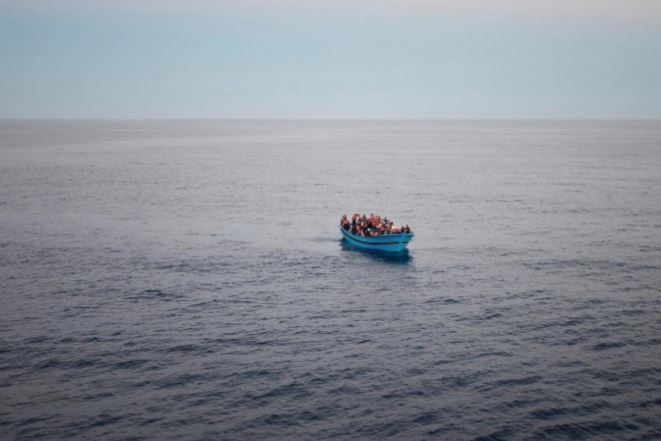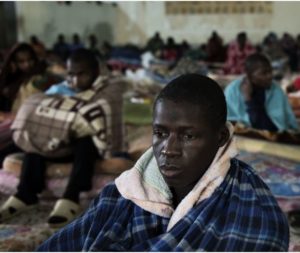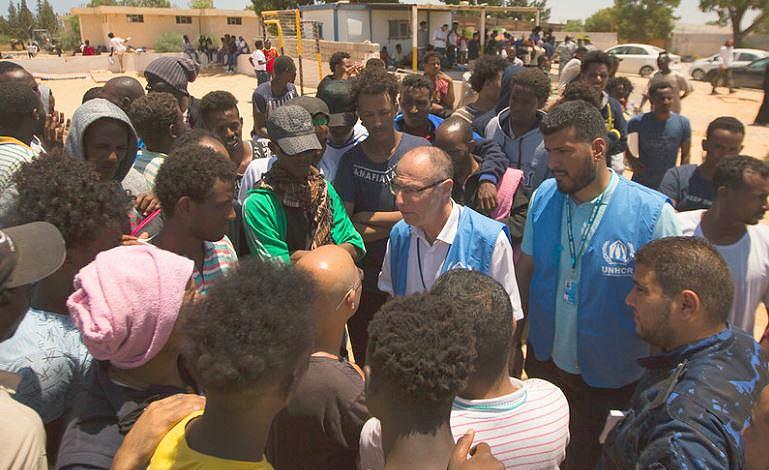Attack on Libyan Refugee Camp Shocks the World

Refugees from Africa try to cross the Mediterranean in an overloaded boat to reach Europe. Refugee boat was seen from the deck of the Italian Coastguard ship, the San Giorgio, during a Mediterranean patrol in 2014. (Photo by Alfredo D’Amato / UNHCR) Posted for media use.
By Sunny Lewis
NEW YORK, New York, July 16, 2019 (Maximpact.com News) – The United Nations Security Council has condemned an airstrike that killed at least 53 people and injured 130 others in a Libyan detention center and is urging all parties to the conflict to de-escalate tensions and commit to a cease-fire.
The Security Council is responding to the July 3 airstrike on the Tajoura Detention Centre on the Mediterranean coast 14 kilometers (8.7 miles) east of the Libyan capital, Tripoli, which left the surviving migrants and refugees “severely traumatized,” UN aid agencies said Friday, asking that all such facilities in the embattled country be closed.
In New York, Security Council President Gustavo Meza-Cuadra of Peru said that the Members of the Security Council are calling on all parties to quickly return to UN political mediation. They reaffirmed their full support for the leadership of Ghassan Salamé, the special representative of the UN Secretary-General, who has led calls for an international inquiry into the airstrikes, insisting the bombing could “constitute a war crime.”
Joel Millman from the International Organization for Migration (IOM) told journalists in Geneva that six children were among the fatalities at Tajoura, where the more than 600 detainees came from at least 17 mainly African States.
About 350 migrants, among them 20 women and four children, were held at Tajoura after the bombing, Millman said. Migrants held in the bombed detention center went on a hunger strike and the UN has now evacuated the detainees to other facilities.
The Tajoura camp was closed July 10 and some 400 survivors of the airstrike were moved to the Gathering and Departure Facility run by the UN High Commissioner for Refugees (UNHCR), which is now badly overcrowded. UNHCR is working to evacuate the most vulnerable among them from Libya.
According to the UN agencies, 3,300 migrants and refugees remain arbitrarily detained in and around Tripoli.
Migrants who survived the deadly airstrike told the “Voice of America” that they had been conscripted by a local militia to work in an adjacent weapons workshop.
The decision to store weapons at the facility in Tajoura may have made it a target for the self-styled Libyan National Army, which is at war with an array of militias allied with a weak, UN-recognized government in the capital.
The Tripoli government has blamed Wednesday’s pre-dawn strike on the Libyan National Army and its foreign backers – Egypt, the United Arab Emirates, Saudi Arabia and Russia. The LNA, led by Field Marshal Khalifa Hifter, says it targeted a nearby militia position but denies striking the hangar where the migrants were being held.
The UN and aid groups have blamed the tragedy in part on the European Union’s policy of partnering with Libyan militias to prevent migrants from crossing the Mediterranean Sea to seek a better life in Europe. Critics say the policy leaves migrants at the mercy of brutal traffickers or confined in detention facilities near the front lines that often lack adequate food and water.
Also calling for an international investigation, UNHCR’s Charlie Yaxley said that both parties involved in the fight for Tripoli – the UN-recognized government and forces loyal to self-styled Libyan National Army commander, Khalifa Haftar – knew where the civilian refugees and migrants were sheltering.
“We reiterate once again that the coordinates of these detention centers in Tripoli are well-known to both sides of the conflict and this was a preventable tragedy that never should have happened,” Yaxley said.
The survivors spoke in a state of shock, said Yaxley, “They spoke to us about seeing their fellow detainees’ body parts dismembered around the center,” he said.
Yaxley cited concerns that, “Some of these detention centers may be being used to store weapons and military equipment.”
“We remind all parties,” he said, “that conflict using civilian infrastructure in that way, would be a violation of international humanitarian law and must be avoided at all costs.”
The African Union’s Peace and Security Council in a Communique released July 5, also asked that “an independent inquiry be urgently instituted, with the participation of the African Commission on Human and Peoples’ Rights (ACHPR), with a view to establishing the facts of the 3 July 2019 attack on the Tajoura Detention Centre near Tripoli and providing recommendations on practical measures for ensuring dignity, well-being, safety and security of migrants.”

Conditions for migrants in Libya are described by UN officials as “inhumane;” aid groups say Libya’s detention centers are “like hell” for migrants. Here, migrants sit on mattresses on the floor at a detention center on the outskirts of Tripoli, February 1, 2017 (Photo by Alessio Romenzi / UNICEF) Posted for media use.
Dozens Die in Latest Mediterranean Drowning
In addition to the Tajoura tragedy, the IOM reported that more than 80 migrants are believed to have drowned after their vessel capsized and sank off the coast of Tunisia while trying to reach Europe from the Libyan port of Zwara.
“The survivors told IOM staff that the inflatable boat carrying 86 people including four women and two children, left Zwara around 6am on July 1,” Millman said. “A few hours later, the boat began to leak and capsized during the confusion and frantic movements of the dozens of people on board.”
The Red Crescent said the Tunisian Coast Guard had recovered 38 bodies from the shipwreck on Thursday.
Noting that “this is not the first such tragedy this year,” IOM said in a statement that two rescues were carried out in May on two overloaded boats.
On one vessel, 59 people went missing and 16 were rescued; on the second, 69 were saved. Both boats reportedly left Zwara.
On July 8, the Alan Kurdi, a vessel operated by the German NGO Sea-Eye, said that it had rescued 44 people from a wooden boat in cooperation with Maltese authorities. The rescue came a day after Malta agreed to allow 65 refugees and migrants picked up by the Alan Kurdi to disembark in Valetta.
So far this year, the UN migration agency has reported 426 deaths from drowning linked to attempts to cross the central Mediterranean route to Europe.
The EU’s Migration and Home Affairs Minister, Dimitris Avramopoulos, told the German newspaper “Die Welt” that “provisional agreements” between EU Member States were needed to deal with rescues of refugees and migrants at sea until reform of Dublin regulations have been completed.
He said “the challenges of migration cannot only be the responsibility of Italy and Malta because these states are located on the Mediterranean.”
Meanwhile, Politico reports that German Development Minister Gerd Müller is urging the European Union to launch humanitarian rescue missions for refugees and migrants from the Mediterranean and from Libyan detention centres.

UNHCR Chief of Mission for Libya, Jean-Paul Cavalieri (center in blue vest, glasses), takes statements from officials, refugees and migrants after arriving at Tajoura Detention Centre, July 3, 2019 (Photo by Mohamed Alalem / UNHCR)
Security Council Worries About Libyan Detention Centers
Back in New York, the members of the Security Council expressed deep concern over the worsening humanitarian situation in Libya and called on the parties to allow full access for humanitarian agencies. The members remain concerned about the conditions in the detention centers which are the responsibility of the Libyan Government.
The members of the Security Council called for full respect for the arms embargo by all Member States, in line with resolution 1970 (2011).
The UN Security Council is composed of 15 Members. There are five permanent members: China, France, Russian Federation, the United Kingdom, and the United States, and 10 non-permanent members elected for two-year terms by the UN General Assembly. Currently, these countries are: Belgium, Côte d’Ivoire, Dominican Republic, Equatorial Guinea, Germany, Indonesia, Kuwait, Peru, Poland and South Africa.
Lasting peace and stability in Libya will come only through a political solution, the Security Council declared, noting the ongoing efforts in support by the African Union, the Arab League and others.
UN Secretary-General Antonio Guterres also is calling for an independent investigation of the circumstances of the airstrikes to ensure that the perpetrators are brought to justice, noting that the United Nations had provided exact coordinates of the detention center to the parties.
Guterres repeated his call for an immediate ceasefire in Libya and a return to political dialogue.
The Secretary-General is reminding all parties of their obligations under international humanitarian law to refrain from directing attacks against civilians. He said this incident “underscores the urgency to provide all refugees and migrants with safe shelter until their asylum claims can be processed or they can be safely repatriated.”
Refugees’ Lives at Risk on Land and at Sea
Libya’s ongoing Second Civil War, which started in May 2014, is a struggle among three main combatants for control of the country and its oil.
The European Council on Foreign Relations (ECFR) describes the complex situation this way. “Since the summer of 2014, political power has been split between two rival governments in Tripoli and in Tobruk, with the latter having been recognised by the international community before the creation of the Presidency Council – the body that acts collectively as head of state and supreme commander of the armed forces – in December 2015.”
The ECFR explains that several types of actor struggle for power in today’s Libya: armed groups; city-states in western and southern Libya; and tribes in eastern and southern Libya.
As of April 2019 the Tobruk government controls the entire eastern Cyrenaica region of the country as well as most of southern Fezzan region and Tripolitania region. The Government of National Accord controls part of the coastal Tripolitania region while forces loyal to the National Salvation Government have a presence in Tripoli, Misrata, and Sirte.
Some 50,000 registered refugees and asylum seekers, and an estimated 800,000 migrants, are currently living in Libya, and many remain detained in the country where “sufferings and human rights abuses continue” say UN officials.
António Vitorino, director general of the International Organization for Migration, and Filippo Grandi, the UN High Commissioner for Refugees, are calling for the protection of refugees and migrants in Libya.
“If the protection of refugees and migrants in Libya cannot be guaranteed,” said the UN officials, “they must be evacuated to other countries. For this to be possible, countries must provide more evacuation and resettlement places, and extra resources.”
Vitorino and Grandi maintain that the international community should “consider the protection of the human rights of migrants and refugees a core element of its engagement in Libya,” pointing out that they have appealed to the European Union and African Union to prevent a repeat of the “tragedy.”
“As a priority, we ask that 5,600 refugees and migrants currently held in centers across Libya be freed in an orderly manner and their protection guaranteed,” they said in a joint statement.
Vitorino and Grandi are asking that Libya end the practice of detaining refugees and migrants rescued at sea, and consider alternatives, such as allowing them to live in the community, in open spaces, or establishing semi-open safe spaces such us the Gathering and Departure Facility run by the UN High Commission for Refugees.
NGO rescue boats must not be punished for saving lives at sea said Vitorino and Grandi.
They are asking that ships from European countries should resume search and rescue operations, which have saved thousands of lives.
Commercial vessels should not be directed to bring rescued passengers back to Libya, said Vitorino and Grandi, emphasizing that NGO boats which have attempted to take on similar operations must “not be penalized for saving lives at sea.”
Survivors rescued from the Mediterranean, said the UN officials, should not be taken to Libya, because it “cannot be considered a safe port.” This year to date 3,750 migrants have been returned to Libya.
Support to Libyan authorities, they conclude, should be conditional on an end to arbitrary detention of refugees and migrants, and a guarantee that human rights will be upheld. Vitorino and Grandi said, “Without this guarantee, support should be halted.”
European Union Offers Funding and Support
But the European Union has just committed to new support for Libya. The European Commission has approved five new migration-related programs in North of Africa totalling €61.5 million. Adopted under the EU Emergency Trust Fund for Africa, these new programs will reinforce ongoing actions to protect and assist refugees and vulnerable migrants in North of Africa especially in Libya, improve the living conditions and resilience of Libyans as well as foster economic opportunities, labor migration and mobility in the North African countries.
Commissioner for Neighbourhood and Enlargement Negotiations, Johannes Hahn, said on July 4, “The events of last night killing migrants are a strong reminder of the need to pursue EU’s efforts to protect them and to put an end once and for all to the Libyan detention system. The EU continues to push for the ultimate closure of detention centers and is working to provide assistance and protection to people in need.”
In the framework of the African Union-European Union-United Nations Task Force, Hahn said the EU supports vulnerable migrants to voluntarily return and reintegrate in their countries of origin and refugees and asylum seekers to be evacuated out of Libya in view of their resettlement.
Our new programs under the EU Emergency Trust Fund for Africa will help to protect vulnerable people, stabilize communities, and reduce hardship for migrants, refugees and local people in areas most affected by migratory flows,” said Hahn. “With these new programs, we continue to support our neighbors in North Africa to respond together to migration-related challenges in ways that safeguard security, rights and dignity of migrants and refugees, in the mutual interest of Europeans and our neighbours.”
Featured Image: Devastation at Libya’s Tajoura Detention Centre after an airstrike, July 3, 2019 (Photo by World Health Organization) Posted for media use via Twitter